The AMD Ryzen 5 1600X vs Core i5 Review: Twelve Threads vs Four at $250
by Ian Cutress on April 11, 2017 9:00 AM ESTBenchmarking Performance: CPU Web Tests
One of the issues when running web-based tests is the nature of modern browsers to automatically install updates. This means any sustained period of benchmarking will invariably fall foul of the 'it's updated beyond the state of comparison' rule, especially when browsers will update if you give them half a second to think about it. Despite this, we were able to find a series of commands to create an un-updatable version of Chrome 56 for our 2017 test suite. While this means we might not be on the bleeding edge of the latest browser, it makes the scores between CPUs comparable.
SunSpider 1.0.2 [link]
The oldest web-based benchmark in this portion of our test is SunSpider. This is a very basic javascript algorithm tool, and ends up being more a measure of IPC and latency than anything else, with most high performance CPUs scoring around about the same. The basic test is looped 10 times and the average taken. We run the basic test 4 times.
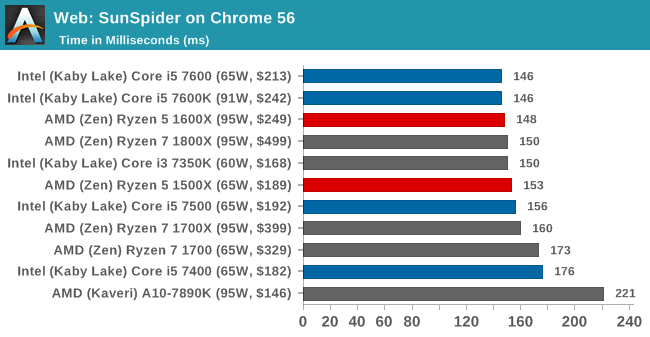
Mozilla Kraken 1.1 [link]
Kraken is another Javascript based benchmark, using the same test harness as SunSpider, but focusing on more stringent real-world use cases and libraries, such as audio processing and image filters. Again, the basic test is looped ten times, and we run the basic test four times.
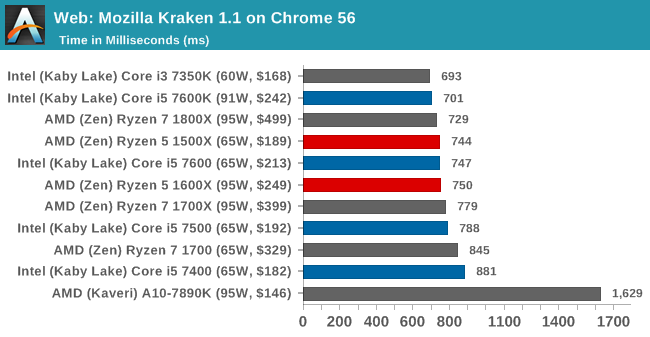
Google Octane 2.0 [link]
Along with Mozilla, as Google is a major browser developer, having peak JS performance is typically a critical asset when comparing against the other OS developers. In the same way that SunSpider is a very early JS benchmark, and Kraken is a bit newer, Octane aims to be more relevant to real workloads, especially in power constrained devices such as smartphones and tablets.
WebXPRT 2013 and 2015 [link]
While the previous three benchmarks do calculations in the background and represent a score, WebXPRT is designed to be a better interpretation of visual workloads that a professional user might have, such as browser based applications, graphing, image editing, sort/analysis, scientific analysis and financial tools. Web2013 is the older tool, superceded by Web2015, however both still are highly relevant for high-performance web applications today.
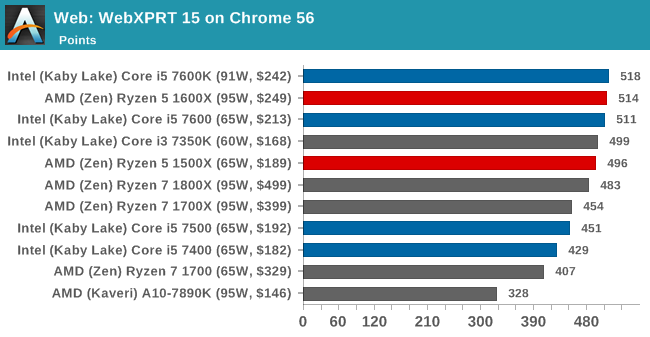


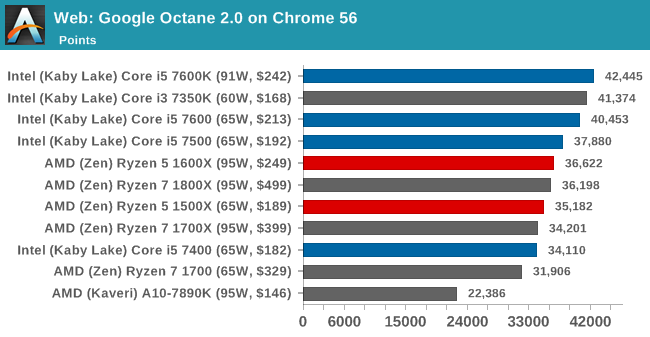
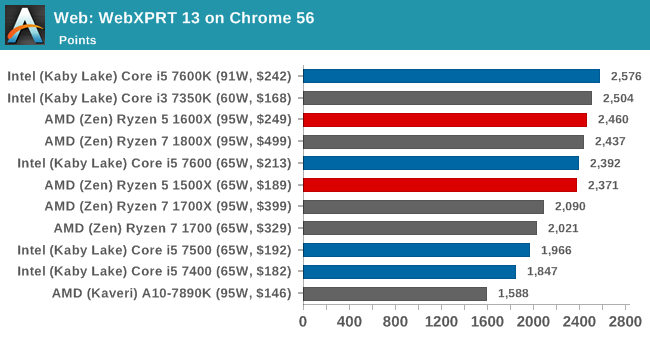








254 Comments
View All Comments
hojnikb - Tuesday, April 11, 2017 - link
Any word on R5 1400 review ? Would be interesting to see how 1/2 of L3 cache hits performance.Ian Cutress - Tuesday, April 11, 2017 - link
We've been promised a sample to arrive soon. I'm off some of next week, so after then :)Omega215D - Tuesday, April 11, 2017 - link
Just steal it from LinusTechTips... You know he has that stuff just lyin' around after fumbling with it =)msroadkill612 - Thursday, April 13, 2017 - link
No, but we have evidence of the effect of double l3 on ryzen cores - if that helps.current 4 core ryzens have double the l3 per core as 8 core ryzens do.
Infy2 - Tuesday, April 11, 2017 - link
Shame 7700K is not among the results so we can't compare Ryzen 4C/8T to the best of Intel's 4C/8T.ddriver - Tuesday, April 11, 2017 - link
Slightly better in games, marginally behind in intensive computations.Ian Cutress - Tuesday, April 11, 2017 - link
For CPU tests, it's in our Benchmark database: www.anandtech.com/benchI still need to run our gaming tests on a whole raft of CPUs, something to do the rest of this month!
0ldman79 - Tuesday, April 11, 2017 - link
Any chance the formatting could be corrected to the FX line can be directly compared to the Ryzen line?Some of the benchmarks overlap but the formatting is different. A direct comparison isn't possible now in a single window. We have to open two windows to compare.
Ian Cutress - Friday, April 14, 2017 - link
All the old data was on Windows 7, the new data is Windows 10. I've made it so in the same window the scores are comparable on the same OS.milli - Tuesday, April 11, 2017 - link
Something really weird is going on with the Rise of the Tomb Raider and Ryzen. There's a huge drop in performance in DX12 for Ryzen+nVidia.I mean, how on earth can the A10-7890K be faster than the 1500X? That game or nVidia's drivers need updating.